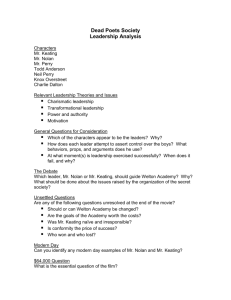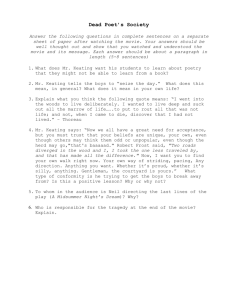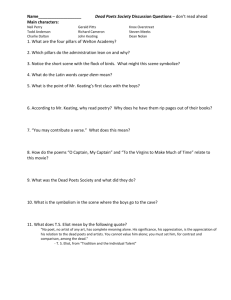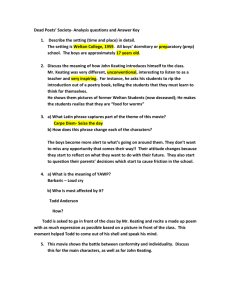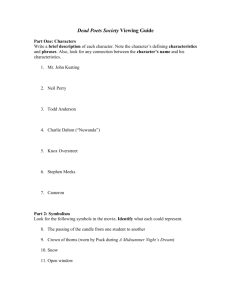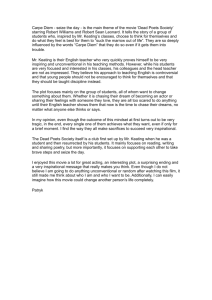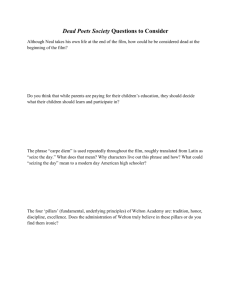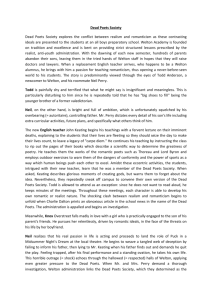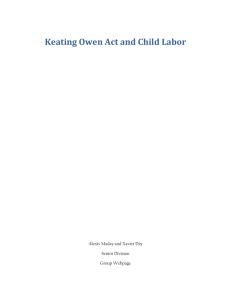Dead Poets Society - Bioethics Education
advertisement
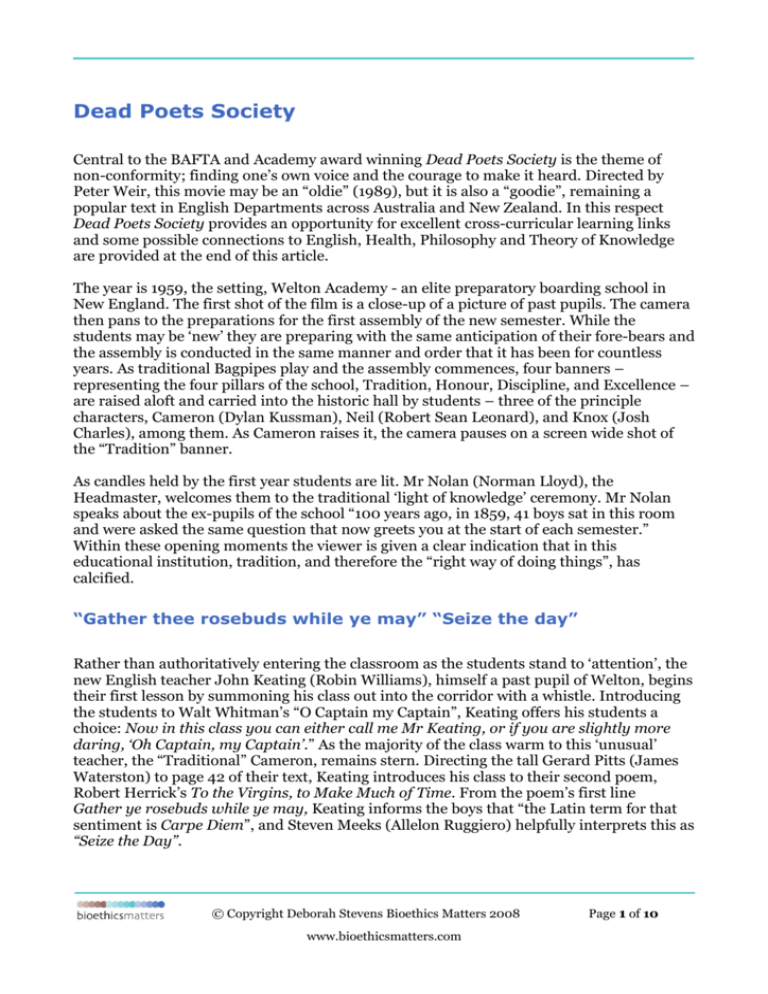
Dead Poets Society Central to the BAFTA and Academy award winning Dead Poets Society is the theme of non-conformity; finding one’s own voice and the courage to make it heard. Directed by Peter Weir, this movie may be an “oldie” (1989), but it is also a “goodie”, remaining a popular text in English Departments across Australia and New Zealand. In this respect Dead Poets Society provides an opportunity for excellent cross-curricular learning links and some possible connections to English, Health, Philosophy and Theory of Knowledge are provided at the end of this article. The year is 1959, the setting, Welton Academy - an elite preparatory boarding school in New England. The first shot of the film is a close-up of a picture of past pupils. The camera then pans to the preparations for the first assembly of the new semester. While the students may be ‘new’ they are preparing with the same anticipation of their fore-bears and the assembly is conducted in the same manner and order that it has been for countless years. As traditional Bagpipes play and the assembly commences, four banners – representing the four pillars of the school, Tradition, Honour, Discipline, and Excellence – are raised aloft and carried into the historic hall by students – three of the principle characters, Cameron (Dylan Kussman), Neil (Robert Sean Leonard), and Knox (Josh Charles), among them. As Cameron raises it, the camera pauses on a screen wide shot of the “Tradition” banner. As candles held by the first year students are lit. Mr Nolan (Norman Lloyd), the Headmaster, welcomes them to the traditional ‘light of knowledge’ ceremony. Mr Nolan speaks about the ex-pupils of the school “100 years ago, in 1859, 41 boys sat in this room and were asked the same question that now greets you at the start of each semester.” Within these opening moments the viewer is given a clear indication that in this educational institution, tradition, and therefore the “right way of doing things”, has calcified. “Gather thee rosebuds while ye may” “Seize the day” Rather than authoritatively entering the classroom as the students stand to ‘attention’, the new English teacher John Keating (Robin Williams), himself a past pupil of Welton, begins their first lesson by summoning his class out into the corridor with a whistle. Introducing the students to Walt Whitman’s “O Captain my Captain”, Keating offers his students a choice: Now in this class you can either call me Mr Keating, or if you are slightly more daring, ‘Oh Captain, my Captain’.” As the majority of the class warm to this ‘unusual’ teacher, the “Traditional” Cameron, remains stern. Directing the tall Gerard Pitts (James Waterston) to page 42 of their text, Keating introduces his class to their second poem, Robert Herrick’s To the Virgins, to Make Much of Time. From the poem’s first line Gather ye rosebuds while ye may, Keating informs the boys that “the Latin term for that sentiment is Carpe Diem”, and Steven Meeks (Allelon Ruggiero) helpfully interprets this as “Seize the Day”. © Copyright Deborah Stevens Bioethics Matters 2008 www.bioethicsmatters.com Page 1 of 10 Urging the class to reflectively consider the photographs of past pupils - “You have walked past them many times but I don’t think you have really looked at them. They’re not that different from you are they?” – Keating gently encourages his pupils to consider their mortality and reinforces the necessity of seizing the day; to become what they are fully capable of; to make their lives extraordinary. Look at things from a different way. Find your own voice: As subsequent lessons unfold, Keating acknowledges that traditions may act as a guide, but should not be accepted at the expense of finding “Your own voice”. Jumping onto the top of his desk and inviting his pupils to join him, Keating encourages his students to examine things from different perspectives: “Just when you think you know something, you have to look at it in a different way. Even though it may seem silly or wrong, you must try. . . . Boys you must strive to find your own voice. . . . Dare to strike out and find new ground.” The Point of Conformity: Literally taking the class to new ground by leading them once again out of the classroom and out into the quadrangle, Keating invites three of them to walk around the area as the others watch. “No grades at stake Gentlemen – just take a stroll”. As the students walk, their steps, initially leisurely and random, become more and more synchronised as each student adjusts their steps to the pattern of the others and within a short time, “There it is!”, exclaims Keating, the three are marching in unison. The rest of the class begin to clap to the rhythm of the marching. “As you noticed, everyone started with their own stride – their own pace.… I brought them up here to illustrate the point of conformity – the difficulty in maintaining your own beliefs in the face of others. … We all have a great need for acceptance, but you must trust that your beliefs are unique, your own, even though others may think them odd, or unpopular; Robert Frost said ‘Two roads diverged in a wood And I took the one less travelled by And that made all the difference”’ As the students begin to think more freely, seven of them secretly revive the “Dead Poets Society” – a club in which, as a student, Keating had been a member. Passionate about acting at which he excels, Neil is selected to play Puck in a local production of A Midsummer Night's Dream. Aware that his parents have mapped out a career in medicine for him, Neil finds himself unable to discuss his desire to pursue an acting career with his authoritarian father (Kurtwood Smith), despite Keating encouraging him to do so. Neil conceals his involvement in the production from his father. He lies to his English teacher, assuring Keating that he has spoken with his father, who has agreed to Neil participating in the play as long as his studies do not suffer. Neil’s father subsequently finds out about the performance, which he attends. Unimpressed, however, Mr Perry does not deliver Neil back to school, but rather takes him back to the family home with the © Copyright Deborah Stevens Bioethics Matters 2008 www.bioethicsmatters.com Page 2 of 10 intention of enrolling him at Braden Military School where he will be prepared for Harvard University and the parentally desired career in medicine. Overwhelmed with his passion for acting, his inability to discuss this with his father and his sense of entrapment, Neil enters his father’s study, and using his father’s revolver, he takes his own life. Taking no responsibility for the death of his son, Mr Perry blames Keating and his free thinking notions. An investigation is held and Cameron assists Headmaster Nolan with his enquiries. Each member of the “Dead Poets Society” signs a document that effectively accuses Keating. Initially resistant, Todd (Ethan Hawke) too is influenced by an authoritarian father and the threat of expulsion and sorrowfully signs the document. John Keating is dismissed from his teaching post at Welton Academy. The opening and closing scenes of the movie provide excellent contrast with respect to principal themes and character development. In the final scene Nolan becomes the temporary teacher of the English class. As he drones on (reading from an essay that Keating had had the students rip from their books at the start of the semester) Keating quietly enters the room to salvage a few personal belongings. Todd takes the opportunity to apologise to his teacher for having signed the confession. A stern Nolan instructs Todd to be silent and demands that Keating leave at once. As he departs, Keating is surprised to hear Todd, now standing on top of his desk call out "O Captain! My Captain!" in salute of his inspiring teacher. In the opening scenes we have watched the boys stand up at the authoritative ‘nod’ from the Headmaster and recite the four “pillars” of the school. This is contrasted beautifully in this final scene of the film when the majority of the boys, courageously led by Todd, stand on their desks to honour Keating “their Captain”. In the final scene, the Headmaster commands the students to sit, but his authority is over-ridden as the members of the Dead Poets Society literally “make a stand” against the tradition of Welton and show their support for Mr Keating. Mr Nolan, seen in the opening assembly standing on a pedestal and filmed from low camera angles, to accentuate his authority (while all the students are seated on pews and are shown from relatively high angles), is now portrayed as powerless and ‘old’. High angles of Mr Nolan accentuate his loss of authority in the final scene, as low angles of students on desks show them to be courageous and victorious. It is Todd who has led the ‘mutiny’. Todd, whose elder brother has attended Welton and who was urged by Mr Nolan in the opening scenes to conform and follow in the family footsteps - “You have big shoes to fill young man. Your brother was one of our finest”. Hesitant to stand in the opening scene – and checking with his father that “it is right” and thus standing slightly later than the others, Todd finds the courage to follow only his heart, making his stand in the final scene with reference to no one. In the film’s finishing scene, Todd is indeed the finest student as he finds his own voice and the courage to have it heard. In contrast, Cameron repeats the voice of others. At the beginning of the film, Cameron is the character who holds the “Tradition” banner. Fittingly, near the film’s end, he is the only one in the reformed Dead Poets Society to immediately conform by signing the document prepared by the headmaster that labels John Keating as a radical who owns responsibility for Neil’s death. Indeed, Cameron provides information that shapes the very © Copyright Deborah Stevens Bioethics Matters 2008 www.bioethicsmatters.com Page 3 of 10 contents of the document. As the film ends Cameron bows to tradition and authority, choosing to conform to the world as it has been painted for him. Instead of honouring Mr Keating as he makes his final departure from Welton, Cameron remains seated. Possible Discussion Questions: (Note that short clips that pertain to these questions are available on YouTube) What does “Seize the Day” mean to you? What does it take to “Make your lives extraordinary”? Does it take courage to see things from another’s point of view? When we consider things from a different viewpoint, we can sometimes see that we were wrong. Does it take courage to apologise? When asked by his students what the Dead Poets Society was about, Keating responds that the "The Dead Poets Society was dedicated to sucking the marrow out of life.” (See “Link to Plato and Socrates below for Thoreau’s full text) What is meant by this phrase? Does it take courage to “suck the marrow out of life?” Cross-Curricular Links: English "We don't read and write poetry because it's cute. We read and write poetry because we are members of the human race. And the human race is filled with passion. And medicine, law, business, engineering, these are noble pursuits and necessary to sustain life. But poetry, beauty, romance, love, these are what we stay alive for." John Keating, Dead Poets’ Society If it is a set text in your school, you may be able to expand themes appropriate to Religious Studies or Philosophy, which will not be covered during English. Alternatively, if not a set film at your school, the English Department may love you for using it to link with their poetry unit! Health Youth suicide is a significant issue in both Australia and New Zealand. This and a number of relationship themes explored in the Health curriculum dovetail with this movie. © Copyright Deborah Stevens Bioethics Matters 2008 www.bioethicsmatters.com Page 4 of 10 Relationships: Between Parents and children • • What degree of authority/control/influence/sway should parents (or teachers) have in a teenage person’s decisions about education/careers/life in general? What kind of involvement is positive and helpful and what kind of involvement is destructive and negative? Relationships: In general • How can you prevent undue manipulation of power/control/pressure/ by parents/teachers/peers? Relationships: Between a teacher and a pupil • • • How close and informal should the relationship between a pupil and a teacher be? Was Mr Keating an ‘effective’ teacher? Where does providing inspiration begin and end? Theory of Knowledge/Education: • • • • • • • What are the traditions of your school and how do these compare with those of Welton? Does the school curriculum give you the opportunity to think? What does this tell you us about knowledge and what it is? Presented with a belief system of a community of ‘knowers’, how can we decide what we personally believe?1 Are there responsibilities that necessarily come with knowing something or knowing how to do something? To whom might these responsibilities be owed?2 Are traditions necessary? Valuable? How important is the study of literature, and of history, in an individuals ethical development? In what ways?3 Two different approaches to education are presented in the film – a traditional, disciplined structure is contrasted with a table standing – view things from a different perspective approach. • What teaching approaches do students find the most effective? • Is there a ‘middle ground’? • Dead Poets Society presents the four pillars - Tradition, Honour, Discipline, and Excellence – that underpin community life at Welton Academy, in a certain way. For example. “Excellence” is measured by what university the student gets into. What other ways of looking at “Tradition”, “Discipline”, “Honour” and “Excellence” are there? 1 IBO Diploma Programme Theory of Knowledge Guide (First examinations 2008) page 11 2 ibid 3 IBO Diploma Programme Theory of Knowledge Guide (First examinations 2008) page 35 © Copyright Deborah Stevens Bioethics Matters 2008 www.bioethicsmatters.com Page 5 of 10 Philosophy : Link to Socrates and Plato:4 A significant scene is the short conversation between John Keating and Headmaster Nolan. Having observed the walking in the courtyard exercise from his office window, Nolan asks Keating what was taking place. Keating explains that it “was an exercise to prove a point about the evils of conformity.” "John, the curriculum here is set," Nolan informs him. "It's proven. It works. If you question it, what's to prevent them from doing the same?" "I always thought education was learning to think for yourself," Keating replies – in effect echoing Socrates. Seemingly amused, Nolan, dismisses such ‘Enlightened’ philosophy: "At these boys' age? Not on your life! Tradition, John. Discipline,” then patting Keating on the shoulder in a fatherly fashion, Nolan proclaims “Prepare them for college, and the rest will take care of itself." An educator who inspired, rather than a teacher who imparted information by rote, Keating’s passion for his subject, translated into his nonconformist teaching methods and declarations, challenging the “Disciplined” “Traditional” pedagogy “Honoured” in the conservative environment of Welton Academy. As a result, Keating, like Socrates millennia before him, is an intellectual dissident within his environment and becomes condemned, in essence for “corrupting the young”. According to the writings of Plato, while on trail for his life, Socrates illustrated that dissent, like a small gadfly, may be relatively easy to squash, yet the cost to society of silencing individuals who were irksome could be considerable. Describing the State of Athens as “a great and noble stead who is tardy in his motions” Socrates saw his role as that of a small irritating fly “fastening upon” the State, “arousing and persuading and reproaching” it “into motion”.5 Similarly, aware of his unsettling effect within the environment of Welton, John Keating clearly defines his effectiveness in terms of being a gadfly: "Every school needs someone like me." In his time, Socrates advised the son of Anytus6 to give up the family business to become a philosopher. Unable to forgive Socrates, Anytus became one of the prosecutors who demanded Socrates’ life. In parallel, John Keating encourages Neil to follow his dream of becoming an actor. Neil’s father Mr Perry becomes the parent who demands that Keating be barred from educating – the occupation that constitutes John Keating’s life – for evermore. You may wish to compare and contrast the image of the cave in Dead Poets Society with that of Plato’s Cave. Within the movie, the student’s most inspiring learning experiences occur not in a classroom, but in a corridor, a quadrangle and most significantly when they “go to the woods”, the Dead Poets cave. Each session in the cave begins with the text from Thoreau’s Walden: 4 A more extensive discussion of this link is offered by Dr. Jorn Bramann of Frostburg State University in his PHIL 490 course, Special Topics in Philosophy: Philosophical Films. Notes are available at http://faculty.frostburg.edu/phil/forum/DeadPoets.htm 5 Speech 1: Socrates Defence (7) The Gadfly 30e to 31c obtainable at http://socrates.clarke.edu/aplg0106.htm 6 ibid © Copyright Deborah Stevens Bioethics Matters 2008 www.bioethicsmatters.com Page 6 of 10 I went to the woods because I wished to live deliberately, to front only the essential facts of life, and see if I could not learn what it had to teach, and not, when I came to die, discover that I had not lived. I did not wish to live what was not life, living is so dear, nor did I wish to practice resignation, unless it was quite necessary. I wanted to live deep and suck out all the marrow of life, to live so sturdily and Spartan-like as to put to route all that was not life. (Note that the version read in the movie is not wholly faithful to the original) Compared to the stately and civilised architecture of Weldon, the cave is ‘earthy’ and primitive, yet it is here that the students explore texts, and ultimately the ‘real’ meaning of ‘life’. © Copyright Deborah Stevens Bioethics Matters 2008 www.bioethicsmatters.com Page 7 of 10 Possible Classroom Activities: Lines from the poems used within the movie, or sayings associated with courage lend themselves to use in a Graffiti Wall activity. This activity may be adapted for use in a number of ways, and is particularly useful if you wish to incorporate stillness and silence into a lesson. You will need: • • • large sheets of paper, preferably A2 paints or heavy felt pens Flexible teaching space Prior to the lesson, paint sayings or quotes onto sheets of paper in a ‘Graffiti” style and use them to create ‘Graffiti stations” around the room. Students may then be divided into even groups and allowed a certain time at each station to read and discuss the ‘Graffiti’. Ideas could be recorded for sharing as a class once all stations have been visited by each group. Alternatively, students could be instructed to read the ‘Graffiti” at each station silently, recording their personal responses in their own journal. (I would encourage the use of colour and art in their journals for this activity.) After all stations have been visited, students could then be instructed to go to the Graffiti station that they found the most stimulating/challenging and group discussion could ensue. Alternatively, students could be given a blank sheet of paper and asked to present their response to the Graffiti that they found the most challenging. These could then be silently displayed around the appropriate Graffiti. Students could be given time to read the now expanded Graffiti displays. An additional follow up activity could include having students from a continuum or “Value Line”. Offer a stimulus statement/s such as those below and have students rank their agreement on a 1 to 10 scale. Once they have chosen their position, have students discuss with those near them why they have chosen their position. A spokesperson may then explain why certain positions have been chosen. After discussion, allow students to change their positions if they wish. “John Keating was a courageous teacher” “Tradition is irrelevant” If you have a very secure environment you may wish to ask “Was Neil Perry courageous”. © Copyright Deborah Stevens Bioethics Matters 2008 www.bioethicsmatters.com Page 8 of 10 Homework, Relief or Discussion resource: A portion of an article written by Glenn Whipp, entitled Jack Be Humble and published in the Sydney Morning Herald of January 31 2003 may provide stimulus material for a debate around nonconformity and the end of the movie. This resource could make a good homework or relief lesson activity. "I remember feeling so cheated by that ending of Dead Poets Society when they all stand up on their desks. Please. It's saying, 'Really in their hearts, people aren't conformists,' when quite the opposite is true. "If I had directed Dead Poets Society, it wouldn't have made half the money it made," Payne continues. "Because at the end, he should go in, they all look at him, they feel guilty for what they've done, you want one of them to stand on their desk, none of them does, and he leaves, and you're left with a more chilling feeling. "That, to me, says the same idea, that we should be nonconformists. The way it's done, you like it and you forget about it. I think it's a little more important to make movies that are challenging at the end. You've got to think about it more and come up with your own response." Bibliography: http://www.etni.org.il/deadpoet.htm © Copyright Deborah Stevens Bioethics Matters 2008 www.bioethicsmatters.com Page 9 of 10 Courage Quotes: Courage is not the absence of fear, but rather the judgement that something else is more important than fear: Ambrose Redmoon It is curious that physical courage should be so common in the world and moral courage so rare: Mark Twain To go against the dominant thinking of your friends, of most of the people you see every day, is perhaps the most difficult act of heroism you can perform: Theodore H. White Moral excellence comes about as a result of habit. We become just by doing just acts, temperate by doing temperate acts, brave by doing brave acts: Aristotle The important thing is this: To be able at any moment to sacrifice what we are for what we could become: Charles DuBois Conscience is the root of all true courage; if a man would be brave let him obey his conscience: James Freeman Clarke To dare is to lose one's footing momentarily. To not dare is to lose oneself: Soren Kierkegaard It takes a lot of courage to release the familiar and seemingly secure, to embrace the new: Alan Cohen Courage doesn't always roar. Sometimes courage is the little voice at the end of the day that says I'll try again tomorrow: Mary Anne Radmacher © Copyright Deborah Stevens Bioethics Matters 2008 www.bioethicsmatters.com Page 10 of 10
